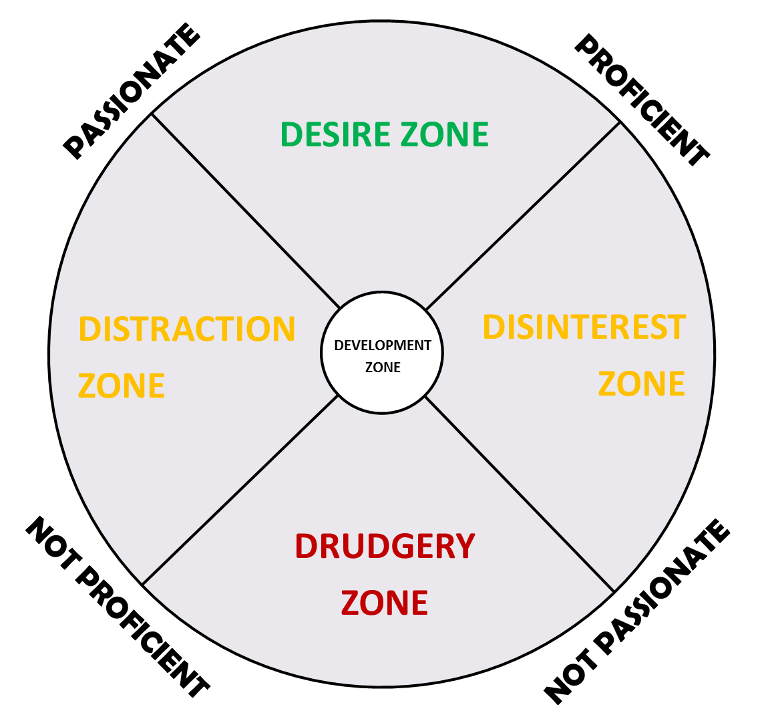Do you jump out of bed in the morning looking forward to your work? Or is your job boring? Or a grind? Or even something you dread? What would it mean to you to have a job you love?

I was recently introduced to a paradigm for thinking about work that I find brilliant. It’s one of those ways of thinking about things that is so simple yet so profound. For most people, I’d wager it is the key to their job satisfaction.
Freedom Compass
The paradigm I was introduced to is called the “Freedom Compass.” I learned about it from Michael Hyatt in his “Free to Focus” course that I attended last month.
In a nutshell, the paradigm looks at your work in terms of your passion and proficiency. Following is my (admittedly rudimentary) sketch of it:

Let me briefly touch on each of the 5 zones:
-
Desire Zone
This is the area where your passion and proficiency combine. When working in this zone, you are fully alive. You’re making the highest contribution you can make. All of your skills and experiences find their culmination. You’re doing what you were born to do. From a spiritual perspective, Hyatt describes the desire zone as where you are answering God’s call.
-
Disinterest Zone
When working in the disinterest zone, you are doing things you’re good at but not passionate about. Because you’re good at these activities, you can earn a living by them. But doing so can feel like a slog because your heart’s not in it.
-
Drudgery Zone
The drudgery zone is the pits. It includes all those activities which you neither enjoy nor are good at. For some, like Hyatt, administrative tasks may fall in this zone. But for others, it could be something like public speaking, which is a “desire zone” activity for Hyatt. The precise activities that spark passion and proficiency differ from person to person.
-
Distraction Zone
Activities in the distraction zone are those that you are passionate about but persistently not good at. Golf is such an activity for Hyatt. Over the long haul, these activities can be time sucks and sources of frustration.
-
Development Zone
Finally, the development zone is a temporary holding place for activities that are too new for you to assess how passionate and proficient you are with regard to them. Public speaking was initially in Hyatt’s development zone before he gained experience with it.
How to Love Your Job
The key to loving your job is doing more activities that you are passionate about and good at and fewer activities where that is not the case.
That is sort of a “no duh” reality. Yet if it truly were, wouldn’t we fight to bring that reality about in our work? But too often we settle for work that doesn’t interest us, or that we aren’t good at, or both.
Take a moment to think about or even jot down the tasks you most often do at work. Where in the Freedom Compass do they fall?
If they all fall in the desire zone, then good for you. Hyatt, himself, estimates that he now spends 95% of his life in the desire zone.
But if your tasks fall into areas other than the desire zone, then the opportunity for greater happiness at work awaits you. In that case, here are 3 ways you can take steps toward that happiness:
-
Eliminate, automate, or delegate tasks outside your desire zone.
Easier said than done, I know, which is why Hyatt spends a lot of time in his “Free to Focus” course walking his students through how to do so. But I’m sure there are some activities you do that are obvious candidates for elimination, automation, or delegation.
-
Have a conversation with your boss.
Many people think their job is inflexible: “It is what it is, and I can’t change it.” Maybe. But don’t start with that conclusion.
Rather, talk with your boss about how you want to make the biggest impact that you, personally, can make. Think that might grab his or her attention?
Then share how moving away from this-or-that task (that you aren’t good at or passionate about) and toward this other activity (that you are good at and passionate about) could enable you to make a bigger impact for the company.
Living in your desire zone is a win-win of epic proportions. Both you and your company benefit.
-
Find a new job.
In some circumstances you may not be able—either on your own or in conversation with your boss—to shape your current role into one that aligns closely enough with your desire zone. In that case, you should look for a new job, either elsewhere in the company or outside the company.
That can be scary. But think what is at stake. If you aren’t working in your desire zone, you aren’t making the biggest impact you can make. You aren’t experiencing the happiness of flourishing. You aren’t utilizing your talents or tapping into your deepest desires. You aren’t living the life that you were born to live.
You owe it to yourself, to your company, and to the world to make a change.
Conclusion
Now don’t get me wrong. I’d work almost any job to put food on my family’s table. Most people would. And for some, that is the only choice they have.
But for those of us fortunate enough to have the bases covered, the question arises: how do I want to spend the substantial portion of my life that I will spend working? Getting ourselves into a job we love can have a huge impact on our happiness—and on our ability to make a difference.
Question: What is one activity in your desire zone and one activity in your drudgery zone? You can leave a comment by clicking here.
If you liked this post, why not join the 5,000+ subscribers who receive blog updates on how to have more time and money for what matters most? Sign up here.

I am an educator. An activity in my desire zone is to teach. I love being in front of a class, teaching them the material, and helping them to make unexpected and insightful interdisciplinary connections and connections with their own life experience. What is in the drudgery zone for me is grading. It piles up sky-high, cuts into family time and (ironically) the time it takes to prepare to teach class well.
I have been working in High School for 2.5 years now, and I have done so because the wages are better than college options, which are also available for me. However, after reading this article, I have renewed my resolve to follow the lights that I know best, the ones that led me to get my PhD in the first place. College is a place where I can flourish, and through writing and presentations, there are more ways than conventional classroom instruction for me to keep teaching. Thank you for sharing these valuable insights from Michael Hyatt.
Go for it, Ezekiel! Even if, for financial reasons, you don’t make the switch right away, getting clear on what you’re aiming for will allow you to see the path to that goal as it comes into view. I wish you all the best in this pursuit!